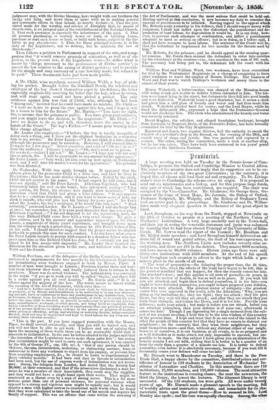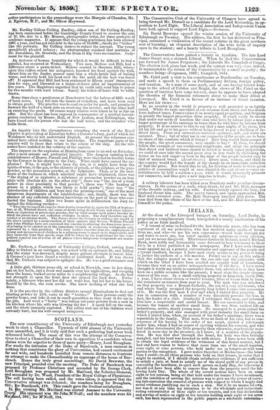Vruniurial.
A large meeting was held on Tuesday in the Senate-house of Cam- bridge, to promote the Oxford and Cambridge Mission to Central Africa. The name of the mission does not imply that its supporters are to be ex- clusively members of the two great Universities ; on the contrary, it is hoped that all classes will lend their aid and sympathy. To Dr. Living- stone's visit to Cambridge the scheme owes its origin. It is proposed to send out six missionaries and a bishop, and for this purpose large funds, only part of which has been contributed, are required. The chair was occupied by the Vice-Chancellor. Mr. Gladstone, Sir George Grey, Go- vernor of the Cape of Good Hope, Dr. Jeremie, the Bishop of Oxford, Professor Sedgwick, Mr. Walpole, and the Bishop of Graham's Town took an active part in the proceedings. Mr. Gladstone and Dr. Wilber- force made very eloquent speeches in furtherance of the great object in hand.
Lord Brougham, on his way from the North, stopped at Newcastle on the 28th of October to preside at a meeting of the Northern Union of Mechanics' Institutions. A very large assembly met in the Town-hall, and their joy at seeing the venerable statesman and jurist was enhanced by learning that he had been elected Principal of the University of Edin- burgh. Mr. Cowen read the report of the Council ; Mr. Headlam and Mr. Ridley made speeches ; and Lord Brougham himself delivered an ad- dress full of sound and genial advice, the fruit of his vast experience, to the working men. The Northern Union now includes seventy-nine as- sociations, and there are 103 in the district. They muster 8000 members, and have access to 80,000 volumes. Eleven years ago there were only thirty-two institutions with 2500 members. At the end of his speech Lord Brougham took occasion to advert to the topic which holds a pro- minent place in the minds of all men. " The want of preparation—the delaying the proper time, the fit time, till it is too late, when the effects of the want have begun to be felt, this is the greatest mischief that can happen, for then the remedy comes too late. The mischief's done ; and this applies to all sorts of pursuits—in peace, in trade, in the matter of health, in war as well as in peace. If you wait till you are attacked, and begin then to defend yourselves, it is too late—you. ought to have defended yourselves, you ought to have prepared your defence, before you were attacked. The greatest orator of antiquity—the greatest orator who ever appeared in the world, tells the Athenians, Why, you are doing as the barbarians do ; they too fight ; they too attack ; they too give blows, but they wait till they are struck ; and after they are struck they put forth their strength, and return the blows, and it is too late. Provide your defences; make your attack ; but make it before you are struck, before you are attacked yourselves, then your defence is of some use; afterwards it comes too late.' Though I am digressing for a single moment from the sub- ject of our present meeting, I hold this to be the true wisdom of this country at the present time. I hope and trust that from one end of the island to the other the people of this country feel that they have no reason to distrust our neighbours ; on the contrary, that they trust their neighbours, but they trust themselves more—and that, without any distrust either of our neigh- bours or of ourselves, it is our business, at all events, to be so prepared and so well defended as to make attack not only, impossible to succeed, but im- possible to be made. On this subject I have given you an illustration of the homely maxim I set out with stating that it is better to be a quarter of an hour too early than a quarter of a minute too late. It is better to defend yourselves even before it is absolutely necessary, because if you wait till it necessarily comes your defence will come too late." (Cheers.) Mr. Disraeli went to Manchester on Tuesday, and there in the Free Trade Hall, a happy choice by the committee, distributed prizes and cer- tificates of honour to 133 students in the Association of Mechanics' In- stitutes of Lancashire and Cheshire. In this association there are 110 institutions, 22,000 members, and 135,000 volumes. The most attractive feature in the institutions is evening classes, the next the newsroom, the third the library, the lowest the lectures. The itinerant library is very successful. Of the 133 students, ten were girls. All were under twenty years of age. Mr. Disraeli made a pleasant speech to the meeting, fvll of worldly advice and instructive anecdote, and remarkable for its cha- racteristic hints upon the great theme—How to succeed in life. Lord Stanley also spoke; and his tone was equally cheering. Among the other
active participators in the proceedings were the Marquis of Chandos, Mr. A. Egerton, M.P., and Mr. Oliver Heywood.
Mr. Eardley Gideon Culling Eardley, eldest son of Sir Culling Eardley, has been summoned before the Cambridge County Court to recover the sum of 31. 16s. due to a Mr. Monson, photographic artist, for three portraits of academic magnates. It appears that the young gentleman has been allowed 400/. a year, and has got into debt to the tune of 16,0001., chiefly for " trifles " like the portraits. Sir Culling desires to reduce the amount. The young spendthrift pleaded infancy; the photographer rejoined that portraits of Dr. Donaldson, Dr. Goodwin, and the Dean of Ely were necessaries. Judg- ment for the plaintiff.
An instance of human brutality for which it would be difficult to find a parallel, has occurred at Wedneebury. Two men, Malone and Hill, had a difference about a pawn-ticket. Malone seemed to threaten Hill, where- upon this ruffian seized his antagonist, knocked his head against the wall, thrust him on the fender, poured upon him a whole kettle full of boiling water, and finally held his head over the fire until all the hair was burnt off! It appeared that Hill had been sentenced to fifteen years' transporta- tion for rape, and liberated on a ticket-of-leave after an imprisonment of five years. The Magistrate regretted that he could only send him to prison for two months with hard labour. Surely his ticket-of-leave will be with- drawn.
Some time since a gentleman at Manchester lost the halves of 8001. worth of bank notes. They fell into the hands of swindlers, and have been used to obtain goods. The practice was to send an order for goods, and promise to forward the half of a bank note on receiving the invoice, and the other half on receiving the goods. Of course many traders were taken in by eo fair an offer. But the cheat has been exposed in consequence of a spirited investi- gation conducted by Messrs. Hall, of New Lenten, near Nottingham, who have found out the person who lost the half notes, and the swindler who holds them.
An inquiry into the circumstances attending the wreck of the Royal Charter is proceeding at Llanaltgo before a Coroner's Jury, part of which are Welshmen who do not understand English. At present the witnesses exa- mined have added nothing to our knowledge. The important parts of the inquiry will be those that relate to the course of the ship. All the wit- nesses have testified to the sobriety of the captain.
The inquest on the explosion at Birmingham came to an end on Saturday, after a most minute and protracted inquiry. The dangers existing in the establishment of Messrs. Pursall and Phillips were sketched in forcible terms by the Coroner in his charge to the Jury. What could have caused the ex- plosion ? Why, it might have been the fire, or it might have been the spirits of wine, or the gas, or the chlorate of potash, or the sulphur, or the gun- powder, or the percussion powder, or the fulminate. Then, as to the inci- dents of the business in which mischief might have originated, there was " the drying of so explosive a substance as percussion powder on an iron plate with absolute fire on the other side"; there was " the fire of a tool- maker in close proximity to that powder "; there was "the heating of grease in a pipkin which was likely to hold sparks"; there was " the introduction of children and boys into the priming-room," one of the most dangerous departments of the establishment; and, finally, there was the absence of any sufficient chemical knowledge on the part of those who con- ducted the business. After two hours spent in deliberation the Jury re- turned the following verdict- " That the deceased all came to their deaths immediately, upon the 27th of Septem- ber, at 22, Whittall Street, the cause of death being divers burns and other injuries from an explosion of percussion powder, but by what means such power became ig- nited the jurors have not sufficient evidence to show. The Jury therefore say the verdict is accidental death. The Jurors desire the Coroner to endorse the record of the above verdict by a memorandum of their opinion that Messrs. William Pintail and John Phillips have not exercised due caution in allowing the dangerous process of priming to be carried on in the immediate vicinity of numerous workpeople only separated by a thin partition. The Jury further consider that the employment of young and inexperienced children in a priming-room is much to be deprecated; and they earnestly hope that speedy steps will be taken by the Legislature for the com- pulsory removal out of towns of all places where dangerous compounds are manu-
factured:" Mr. Cookson, a Commoner of University College, Oxford, rowing from Utley to Oxford in an outrigger, was seized with an epileptic fit, and falling into the water was drowned, despite many gallant attempts to rescue him. A Coroner's jury have found a verdict of accidental death. It was shown that Mr. Cookson was subject to epileptic fits, He was a good swimmer and sculler.
A little girl, thirteen years old, at school in Norwich, rose in her sleep, put on her boots, and a frock and mantle over her night-dress, and escaping from the house, walked seven miles to a neighbouring village. As she had not strength to open the front door she opened the back door. Fortu- nately, a labourer who met her did not wake her, but led her to his house. Seated by the fire, she soon awoke. She knew nothing of what she had done.
It is the practice in the colliery districts around Birmingham to deal out blasting powder in 251b. casks to the "bottles." These persons carry the powder borne .and take it out in small quantities as they want it for use in the pits. Last week a " butty " was taking out some powder from a cask in his kitchen where his wife was blowing the fire ! A spark fell on the cask, and the whole instantly exploded. The collier and one of his children were seriously hurt, but his wife escaped uninjured.



























 Previous page
Previous page